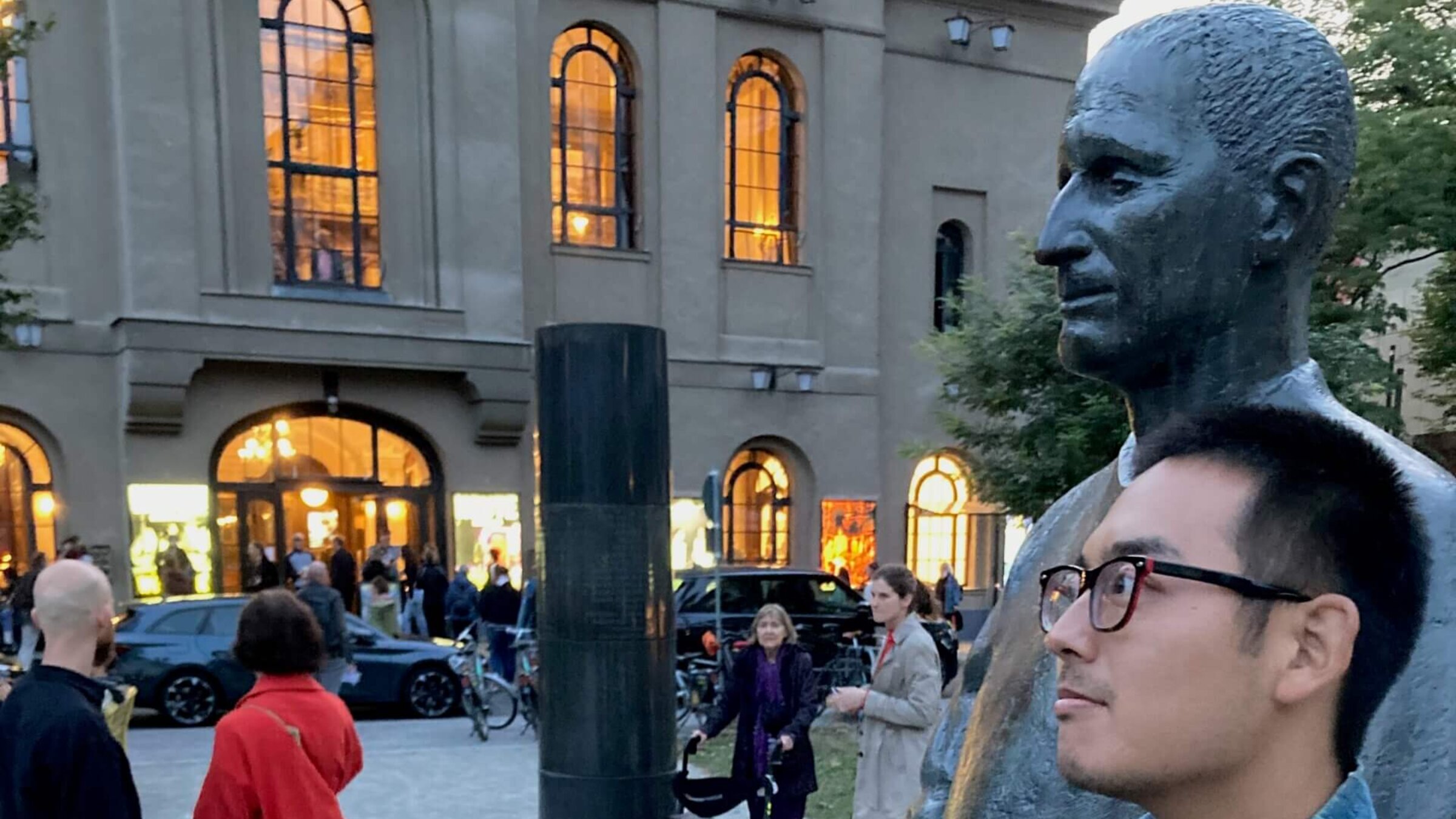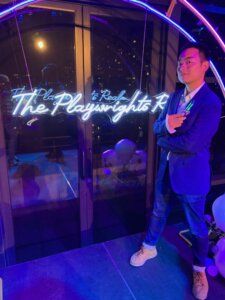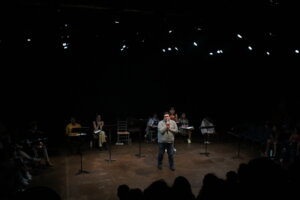At the nexus of Bertolt Brecht and Bernie Sanders, a young playwright finds his place
An avowed socialist, Jesse Jae Hoon uses his plays to merge the personal and the political

Literally and figuratively, Jesse Jae Hoon stands in the shadow of Bertolt Brecht. Courtesy of Jesse Jae Hoon
In Jesse Jae Hoon’s plays, the political is personal. The goal of his passionate, rigorous and bitingly funny plays, he says, “is to make you feel what the politics are.” A fervent socialist, Jae Hoon, 31, creates characters who serve as microcosms of the crises and chaos he attributes to capitalism.
Growing up in Chicago, the son of two artists, he spent his early years surrounded by art. Nearly every year, his parents traveled for work to Berlin where Jae Hoon was exposed to studio art, performance art, and, later, such hallowed theatrical institutions as Schaubühne and the Berliner Ensemble. He spent a few summers taking classes at the Goodman Theater and later moved to New York to study acting at NYU.
It wasn’t until three years after graduation that Jae Hoon wrote his first play, Dong Xuan Center. The play concerns Vietnamese guest workers in Berlin, exploring the economic circumstances that have produced the rise of the far-right in Germany, and how they clash with immigrant communities. But Jae Hoon says that, really, it wasn’t until he started his MFA in playwriting at Hunter College that “the political elements of my work kind of started to creep in.”

Jae Hoon says he is uninterested in “art as activism,” rejecting the “individualist,” “Aaron Sorkin-y” notion that “all we need to do is win the marketplace of ideas through art.” Nonetheless, he believes in the potential of theater as a mobilizing force, and became fascinated when he discovered Bertolt Brecht’s lesser-known lehrstücke, or “learning plays.”
“We are being taught politics by every piece of art,” Jae Hoon, a former volunteer for candidates endorsed by the Democratic Socialists of America, including Bernie Sanders and Alexandria Ocasio-Cortez, and an organizer with Theater Workers for a Ceasefire, told me. “The Marvel films teach us about militarism. They teach us about nationalism. And they instill those values in their audiences. That is propaganda, and we are being propagandized. So, when I was thinking about the lehrstücke, I was, like, well, there are ways that we learn politics in America, and this is a specific way that Brecht was thinking about how people learn in that specific context in Germany.”
Jae Hoon wrote three Brecht-inspired works for Project Lehrstücke, a commission from NYC’s Ma-Yi Theater, shaped by his thinking about “working-class Asian communities and the way they engage with art – or don’t get to engage with art. “
Jae Hoon says he has been profoundly influenced by the people he spoke to while knocking on doors during Bernie Sanders’ 202o presidential bid, whose politics, he observed, tended to derive “from the pain of just everyday life in poverty in America.”
“Understanding how people live their lives, and how people form beliefs and habits out of their given circumstances,” Jae Hoon says, is crucial to his work.

Jae Hoon recently adapted Emily Guendelsberger’s 2019 memoir On the Clock about the author’s experiences working at an Amazon warehouse, a Convergys call center, and a McDonald’s. “Through the course of the book, you read about this woman being psychologically tortured and broken down,” he said.
“What I’m trying to do in the script version of that,” he added, is “take you through how that feels in the way that she does in the book.”
This summer found Jae Hoon at the nation’s largest Jewish theater for the inaugural workshop of his play, Do You Think I’m Annoying? Through their “Expanding the Canon” initiative, Washington, DC’s Theater J has commissioned seven playwrights, who “want to explore what it is being a Jew of color.”
Though the characters in the play — about OCD, adoption, and “two girls in Oak Park, Illinois” — are explicitly Jewish, Jae Hoon says that, due to his socialist politics, he doesn’t write about identity in a way that might be expected or familiar. “I don’t think of identity in the same way as is commonly described in popular culture,” he told me. “It can be a little jarring for people to engage with the way I talk about identity versus how we are used to discussing it.”
Jae Hoon calls the play his “most personal,” adding that “I’m interested in adoption, and I am adopted, but I’m not interested in my own adoption.”
Even so, he said, “it was unavoidable that it was going to, like, be a personal work because I am adopted, I have OCD.”
Currently, Jae Hoon is gearing up for a public reading of his play I’ve Got a Sinking Feeling in the Pit of My Stomach with the Rattlestick Theater on Sept. 10. Nicknamed “German Lesbian Boxers” by Jae Hoon and his friends and set in Berlin circa 1920, it centers “two boxers who meet on either sides of the ring and they find themselves on either sides of a political coup.”
He is also developing Saved, about the Korean adoption industry’s history and relationship to US imperialism, in the Emerging Writers Group at The Public Theater.
In all his plays, Jae Hoon is guided by the philosophy that, “What you have to do with politics and theater in America, because so many audiences will hear, like, a lecture and go, like, ‘Oh, well, I can’t listen to this,’ you then have to get past that by showing – showing them what it feels like,” he said. “There’s nothing like watching someone’s experience and going, like, ‘Shit, I didn’t realize it felt like that. I didn’t realize people felt this way.”
A message from our Publisher & CEO Rachel Fishman Feddersen

I hope you appreciated this article. Before you go, I’d like to ask you to please support the Forward’s award-winning, nonprofit journalism so that we can be prepared for whatever news 2025 brings.
At a time when other newsrooms are closing or cutting back, the Forward has removed its paywall and invested additional resources to report on the ground from Israel and around the U.S. on the impact of the war, rising antisemitism and polarized discourse.
Readers like you make it all possible. Support our work by becoming a Forward Member and connect with our journalism and your community.
— Rachel Fishman Feddersen, Publisher and CEO





























